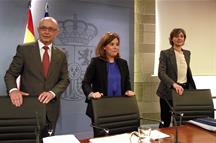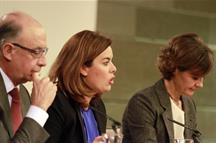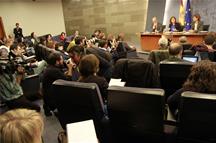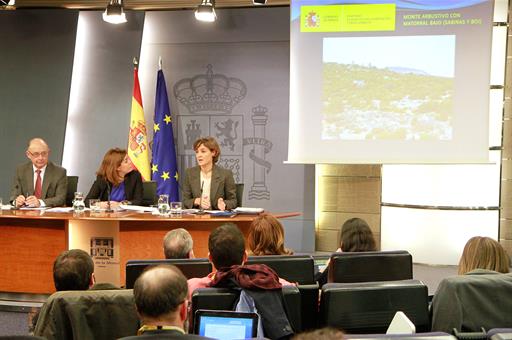Council of Ministers
Government boosts modern, swift, efficient and transparent public administration
Council of Ministers - 2015.1.9
Moncloa Palace, Madrid
The Council of Ministers analysed the Draft Bill on the Common Administrative Procedure of the Public Administration Services, which regulates external relations between the public administration and citizens and companies.
The Minister for the Treasury and the Public Administration Services, Cristóbal Montoro, stressed that the reform of the public administration is a "positive experience" because "it is facilitating the exit from the economic crisis" and will lead to "us having a modern, swift, efficient and transparent public administration by the end of this term of office".
Cristóbal Montoro highlighted that in order to achieve these objectives, the extensive use of information technologies will be driven forward in relations between citizens and the public administration. "Our public administration services will be electronically integrated, paperwork will disappear and it will be fully interconnected".
The minister stressed that citizens may carry out their administrative tasks 24 hours a day regardless of the body they are dealing with. Moreover, the administration itself will be able to obtain the copies it requires of any document that is electronically registered. "The infamous red tape will be a thing of the past".
 Pool MoncloaIn addition, ways for citizen identification will be simplified and carried out electronically. The minister clarified that electronic passwords will be facilitated to users on the spot to implement the necessary procedures and that those who require help will receive the necessary assistance from public servants.
Pool MoncloaIn addition, ways for citizen identification will be simplified and carried out electronically. The minister clarified that electronic passwords will be facilitated to users on the spot to implement the necessary procedures and that those who require help will receive the necessary assistance from public servants.
In this regard, the Vice-President of the Government highlighted that those citizens without Internet or who do not wish to handle procedures over the Internet "may do this by traditional processes, but that electronic procedures will become the habitual working process".
Benefits for companies
Cristóbal Montoro explained that companies will be obliged to maintain relations with the public administration services on an electronic basis, as they have been doing with the Tax Office and the Social Security system. As a general rule, they will not have to present documents that have been previously registered or drawn up by the public administration, which will speed up administrative procedures. They may also grant powers of attorney electronically so that their legal representatives can perform administrative procedures.
At a national level, the new legislation will come into force in January and June so that companies can plan their activities with greater certainty and adapt better to the legislative changes.
Internal functioning of the public administration
The minister announced that communications between the different public administration services will be exclusively electronic, thus reducing the time for reporting and processing procedures to the benefit of the public.
 Pool MoncloaWith the aim of increasing transparency, a single, public list of all the bodies and entities that may be consulted by citizens and companies will be drawn up. Furthermore, a State register will be set up that will include all the cooperation bodies in which the General State Administration participates, together with all the agreements it has entered into with the rest of the public administration services.
Pool MoncloaWith the aim of increasing transparency, a single, public list of all the bodies and entities that may be consulted by citizens and companies will be drawn up. Furthermore, a State register will be set up that will include all the cooperation bodies in which the General State Administration participates, together with all the agreements it has entered into with the rest of the public administration services.
Cristóbal Montoro also highlighted that a public consultation process is due to be carried out prior to drawing up the new legislation, and the effects and degree of compliance with the legislation approved the previous year will be evaluated.
On another note, the Sector Conferences (main cooperation body between the State and the regional governments) will be notified of the planned legislative bills when this may affect the powers of other public administration services with the aim of avoiding duplication and overlapping.
Draft Bill on the Public Sector Legal System
The government also analysed the Draft Bill on the Public Sector Legal System, which focuses on the organisation and internal relations within each public administration service and between the different public administration services.
Cristóbal Montoro pointed out that the new legislation affects the fiscal consolidation implemented during this term in office and establishes new grounds for dissolving public entities, such as due to an economic imbalance over more than two financial years or because it no longer meets its object as a public entity. Furthermore, the creation of any new State body must be fully justified and be economically sustainable.
The minister announced that, for the first time, the operation of the Conference of Presidents, the content of the sector conferences and the suitability requirements to be met by members of the government and director generals, will be regulated by law.
CORA annual report
 Pool MoncloaThe Vice-President of the Government highlighted that the report on monitoring the implementation of the Report of the Commission for the Reform of the Public Administration Services (Spanish acronym: CORA) for the year 2014 presents some very positive data. To this effect, the Minister for the Treasury and the Public Administration Services stated that the figures are "impressive", and in great part respond to the performance of the regional administration services. "Nobody should view this as only an effort on the part of Central Government".
Pool MoncloaThe Vice-President of the Government highlighted that the report on monitoring the implementation of the Report of the Commission for the Reform of the Public Administration Services (Spanish acronym: CORA) for the year 2014 presents some very positive data. To this effect, the Minister for the Treasury and the Public Administration Services stated that the figures are "impressive", and in great part respond to the performance of the regional administration services. "Nobody should view this as only an effort on the part of Central Government".
Soraya Sáenz de Santamaría specified that the measures to reform the public administration as a whole, tackled since the start of this legislature, have resulted in an accumulated saving of more than 18 billion euros. Of this amount, 4.77 billion correspond to Central Government, 10.51 to the regional governments and 2.9 to local authorities.
The total number of public bodies eliminated amounts to 2,029; more than 58% of all measures have now been implemented and 27% are in the final phase or at a very advanced stage of implementation. Moreover, as a result of the removal of barriers for citizens, a saving has been generated for companies and individuals of some 1.7 billion euros.
The Vice-President of the Government also reported on the approval of 19 new measures to reduce administrative burdens which will result in an annual saving of 74,843,814 euros. Among these, she mentioned the measure enabling a change of residence through a platform for the intermediation of data and another measure that sets up driver accreditation centres to process the renewal of driving licences for persons with disabilities.
Countryside Act
The Council of Ministers approved a draft law amending the area concerned Act with the main aims, according to the explanation offered by the Minister for Agriculture, Food and Environmental Affairs, Isabel García Tejerina, of "protecting our diversity, preventing forest fires and combating climate change", as well as facilitating the economic exploitation of forestry resources that can contribute to the creation of wealth and employment in the rural environment.
In order to achieve these objectives, we must facilitate and improve the management of the countryside, which includes "all surface areas except those for agricultural use and urban areas", specified Isabel Garcia Tejerina. To this end, the draft law provides for a new classification of the countryside, the simplification of management instruments and the incorporation of new positions to help facilitate this.
In regard to the classification, which will be "clearer and more specific", this deals with two criteria: the status as public or private and the function it performs, whether or not the area concerned is of general interest.
In terms of the simplification of the management tools, the minister pointed out the obligation to organise the countryside that meets a public utility function, and added that the regional governments can establish standard management models according to the characteristics of the different types of countryside.
 Pool Moncloa The new legislation establishes a new position that enhances countryside management without the need for the agreement of all the land-owners, thus avoiding its management being abandoned when ownership corresponds to various parties and one or some of them are unknown.
Pool Moncloa The new legislation establishes a new position that enhances countryside management without the need for the agreement of all the land-owners, thus avoiding its management being abandoned when ownership corresponds to various parties and one or some of them are unknown.
On this point, Isabel García Tejerina commented that "there is a great deal of countryside in Spain that is not under management and this means that it has been abandoned and is deteriorating because the ownership of the land is unknown or because it does not have sufficient size for it to be managed. What we seek to do through these figures is avoid this abandonment and deterioration and facilitate the management of the countryside, because well-managed countryside is well cared-for countryside, and well cared-for countryside is countryside with far less likelihood of catching fire".
The minister also explained that the reform incorporates measures against illegal timber felling and its subsequent sale. To that end, the classification of penalties will be increased according to the damage caused, both in terms of the economic amount and the time needed for the land to recover.
National Strategy on the Administration of Hunting and Fishing
With participation from the regional governments, the Ministry of Agriculture, Food and Environmental Affairs will draw up a National Strategy on Wildlife Management to coordinate those aspects of game hunting that affect more than one autonomous region.
A Spanish register of hunting and fishing offenders will also be created for informative purposes. This register will facilitate, according to the minister, a mechanism for the mutual recognition of licences between the different regional governments. In fact, for the upcoming hunting season, those autonomous regions that have signed up to the agreement will have a single licence that will allow hunters to act throughout the entire territory of these regions.
Current affairs
 Pool MoncloaWhen asked about the situation and the measures adopted in our country in view of the Jihadi attacks in Paris this week, the Vice-President of the Government stressed that Spain is one of the "safest countries in the world", our legislation is "very strict on counter-terrorism", our information services and international cooperation operate well and our law enforcement agencies are, "as has been demonstrated on many occasions", highly prepared and perform great work.
Pool MoncloaWhen asked about the situation and the measures adopted in our country in view of the Jihadi attacks in Paris this week, the Vice-President of the Government stressed that Spain is one of the "safest countries in the world", our legislation is "very strict on counter-terrorism", our information services and international cooperation operate well and our law enforcement agencies are, "as has been demonstrated on many occasions", highly prepared and perform great work.
However, she specified that, for reasons of prudence, the alert level has been stepped up a notch because "zero risk does not exist", and "no-one is free from this barbaric action".
The Vice-President of the Government set out the main lines of development of the legislative calendar for the next six months - measures that foster employability tied to training and self-employment; an extensive and ambitious social agenda; the continuity of the implementation of structural reforms; the consolidation of the reform of the public administration services and the adoption of measures on democratic regeneration and the fight against fraud and corruption.
As regards government aid for those suffering from Hepatitis C, Soraya Sáenz de Santamaría pointed out that measures will be adopted in line with the recent Strategic National Plan, with the collaboration of the regional governments and patients' associations in order to ensure "fair treatment based on clinical criteria". On this issue, she specified that the scientific approach must prevail over any political approach and that the coordinator of the plan, Juan Rodés Teixidor, has an "excellent track-record" as a hepatologist.
In response to questions from journalists, the Minister for the Treasury and the Public Administration Services declared that the government's intention is for the future Tax Law to allow the Tax Office to publish the list of late payers and of those who have been found guilty of fraud by a binding legal ruling.





